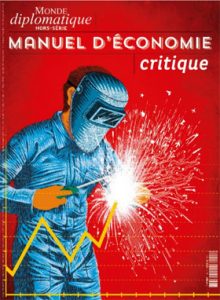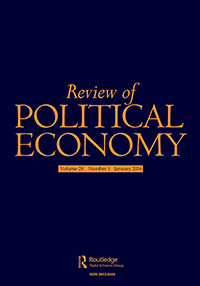Presentation at the Seminario sobre Neoestructuralismo y Economia Heterodoxa, CEPAL, Octobre 2013
Powerpoint presentation at a seminar in the French-Japanese House, Tokyo (Japan), September 19, 2016
 in manual of critical economics, world diplomatic, Special Edition, 2016, p. 166-167.
in manual of critical economics, world diplomatic, Special Edition, 2016, p. 166-167.
Toulouse – 15 September 2016
Presentation of the “Manual of critical economy.”
On Thursday, September 15, at 20 h 30, room of the Seneschal, presentation of the “Handbook of critical economy” with Renaud Lambert and Hélène Richard.
By signing the failure of liberal theories, the financial meltdown of 2008 could encourage Western Governments to renew their economic policies. She has instead tightened the shackles of neoclassical economics, in the morning Chronicles as in textbooks.
The contre-manuel of the diplomatic world intends to reverse this logic. His ambition? Make it accessible to the larger economy and highlight the nature policy. In short, remember that, as the public thing, the economy is everyone’s business. And allow everyone to seize through four objectives:
- provide a historical and international lighting often forgotten;
- introduce the analysis of schools of thought marginalized in universities and private access to the media;
- debunk conventional wisdom that install the fatalism in the minds;
- clear the horizon by recalling that other avenues open to us.
Renaud Lambert and Hélène Richard are members of the editorial staff of the diplomatic world they both coordinated the realization of the critical economy manual.
The diplomatic world is tackling misconceptions about free trade, finance, the sharing of wealth, etc.
Mechanisms within the reach of all
From the economy first and senior programs
Inscrutable equations, enigmatic curves, nebulous reasoning… The dominant economy invites to a double renunciation: in front of the technical difficulties of a universe that is reserved for the experts, on the one hand; front of the immutable scientific “laws”, on the other. The contre-manuel of the ‘diplomatic world’ intends to reverse this logic. His ambition? Make it accessible to the larger economy and highlight the nature policy. In short, remember that, as the public thing, the economy is everyone’s business. And allow everyone to seize.
There is urgency: by signing the failure of liberal theories, the financial meltdown of 2008 could encourage Western Governments to renew their economic policies. She has instead tightened the shackles of neoclassical economics, in the morning Chronicles as in textbooks.
We have therefore gathered some of the specialists of the most lucid economy – researchers, teachers of University and high school students, journalists – around first and senior programs to offer ‘our’ treatment. Around four objectives: contribute a historical and international perspective often forgotten programs; introduce the analysis of schools of thought marginalized in universities and private access to the media; debunk conventional wisdom that install the fatalism in the minds; clear the horizon by recalling that other avenues open to us.
Away from the dogmas, our manual invites to put the economy at the service of society.
Read “the economy as never explained you it” by Renaud Lambert and Hélène Richard in ‘Le Monde diplomatic’ September 2016
Contributed to this manual:
Samir Amin, Guillaume Barou, Aurélien Bernier, Sophie Bedford, John Bertrand, Robert Boyer, Benoit Bréville, Martine Boston, Mona Chollet, Laurent Shoemaker, François Denord, Xavier Devetter, Cedric Durand, Frédéric Farah, Cyrille Freeman, Jean Gadrey, Paul Guillibert, Serge Halimi, Michel Husson, Sabina Issehnane, Raoul Marc Jennar, Renaud Lambert, Serge Latouche, Frédéric Lebaron, Sylvain Leder, Frédéric Lemaire, Frédéric Lordon, Jean-Marie Monnier, Caroline Oudin-Bastide, Juan Miguel Pérez , Evelyne Pieiller, Michel clip and Monique Pinçon-Charlot, Dominique Plihon, Laura Raim, Christophe Ramaux, Gilles Raveaud, Mathias Reymond, Hélène Richard, Pierre Rimbert, François Ruffin, Pierre Salama, Emilie Sauguet, Alexis Spire, Philippe Steiner, Tinel Bruno, Julie Valentin, Julien Vercueil, Ibrahim Warde, Arnaud Zacharie, Daniel Zamora.
Especially in the summary:
- Public debt, does cost?
- Schools of economic thought
- How the credit card was invented
- Flexible working, the impasse
- Where free trade agreements?
- What does a financial crisis?
- With the onslaught of the state charity
- These wars at the service of trade
- Basic income, a utopia?
Available on newsstands September 8, 2016
-Format: 21 cm X 28.5 cm
-Number of pages: 196
-Delivery within 3 weeks
List of chapters:
I. a science like the others?
II. Produce more, always more!
III. The bridge and the hold
IV. Sharing the wealth: hopes and dead ends
V. employment, at what price?
VI. The market or the construction of a no-brainer
VII. Globalization: the competition of peoples
VIII. Currency, an Enigma ringing and stumbling
IX. Debt: the blackmail
X. Finance: the unsustainable promise
 Translation Toshio Yamada and Hinori Yokota, in Japanese, Edition Fujiwara Shoten, Tokyo, Japan, September 2016.
Translation Toshio Yamada and Hinori Yokota, in Japanese, Edition Fujiwara Shoten, Tokyo, Japan, September 2016.
作られた不平等
日本、中国、アメリカ、そしてヨーロッパ
- ロベール・ボワイエ
- 横田宏樹 = 山田鋭夫 = 監修 訳
![9782707190987[1]](http://robertboyer.org/wp-content/uploads/2016/09/97827071909871.gif) In Bertrand Badie and Dominique Vidal (under management), who rules the world? The State of the world 2017, Editions La discovery Paris, pp. 69-85, September 2016.
In Bertrand Badie and Dominique Vidal (under management), who rules the world? The State of the world 2017, Editions La discovery Paris, pp. 69-85, September 2016.
Intervention in the days "Spring of the economy", debate with Patrick Artus Intervention in the economy, Paris days.
Review of Political Economy, January 2016, flight 28 (1 ), pp. 1-22.
), pp. 1-22.
in Pierre Berthelier, Bourges. The shadow of Paris (power, economy and society of the great plague in the Revolution) – 1350-1795, L’Harmattan, Paris, Avril 2016, p. 7-16, Preface.





